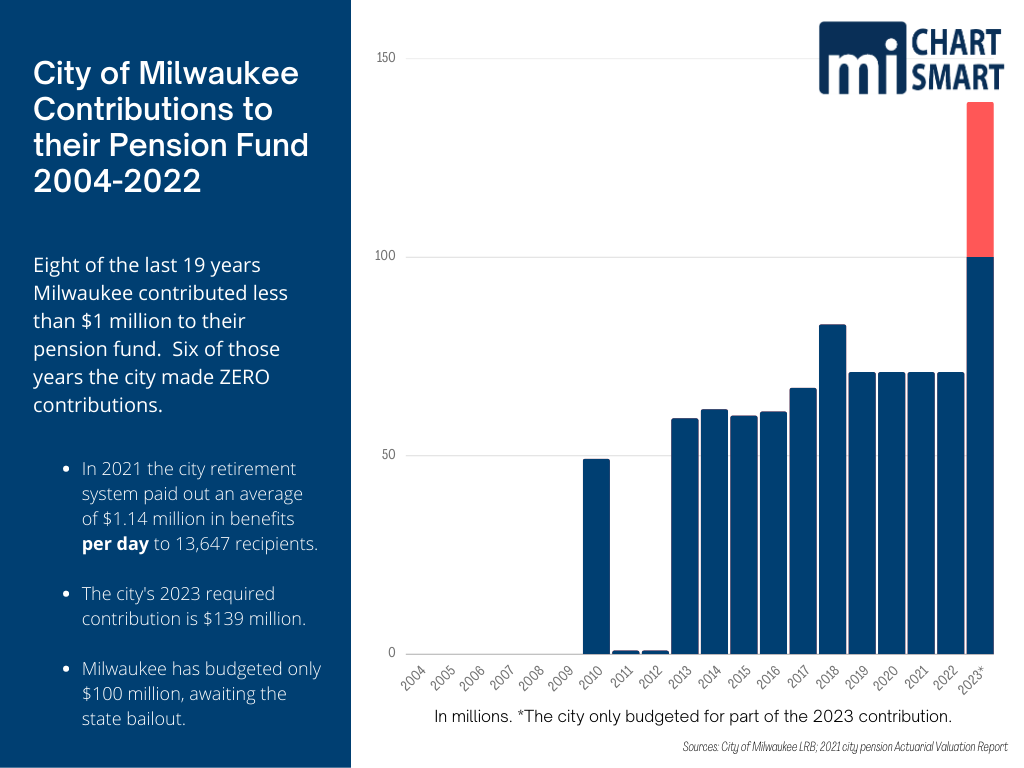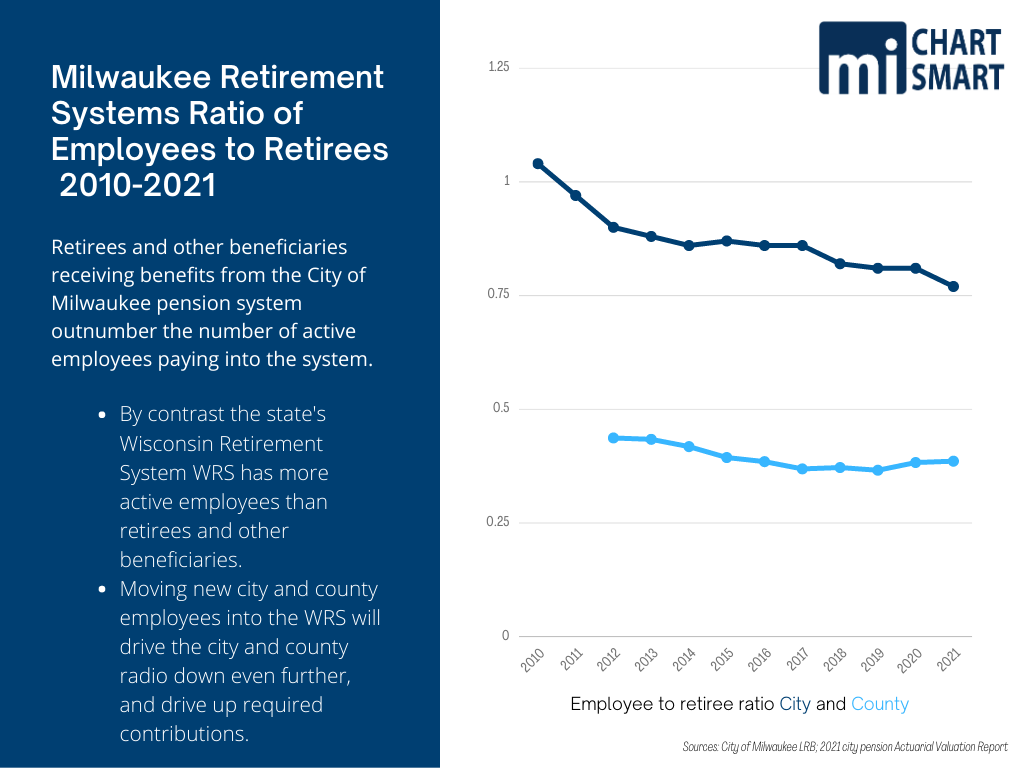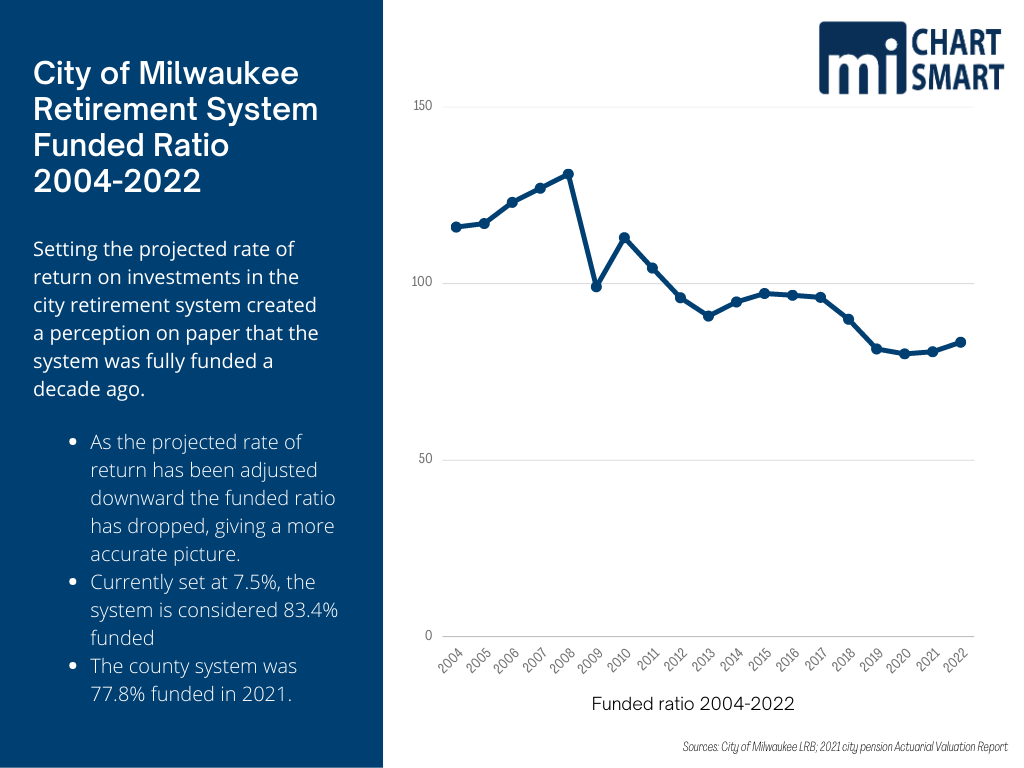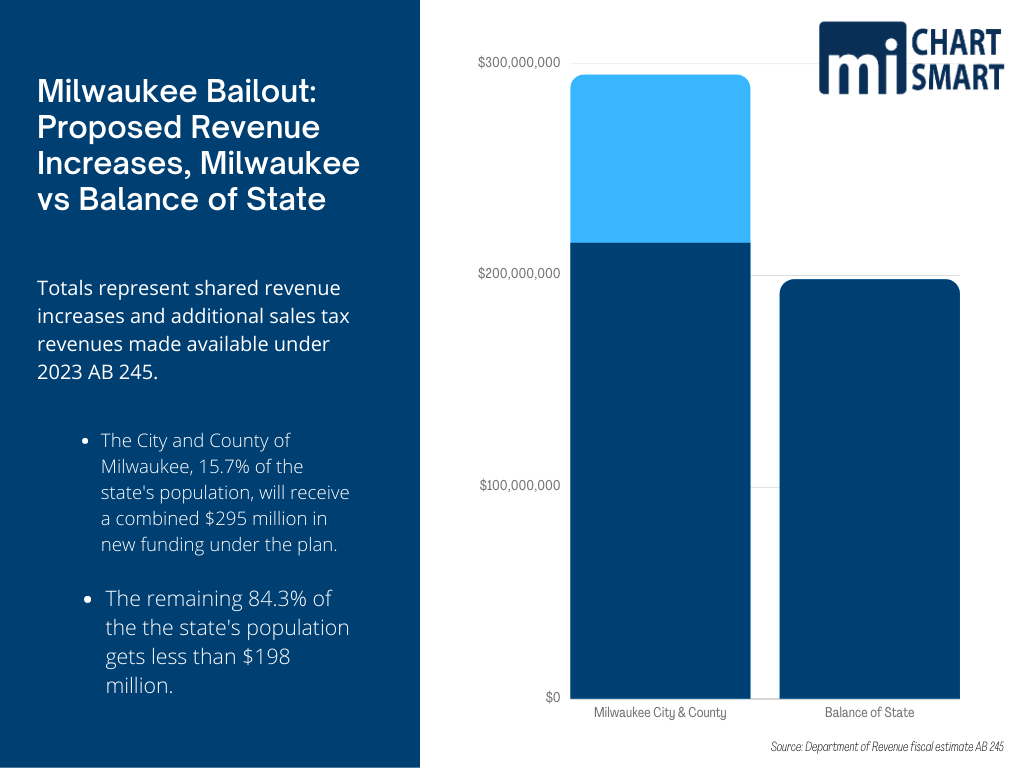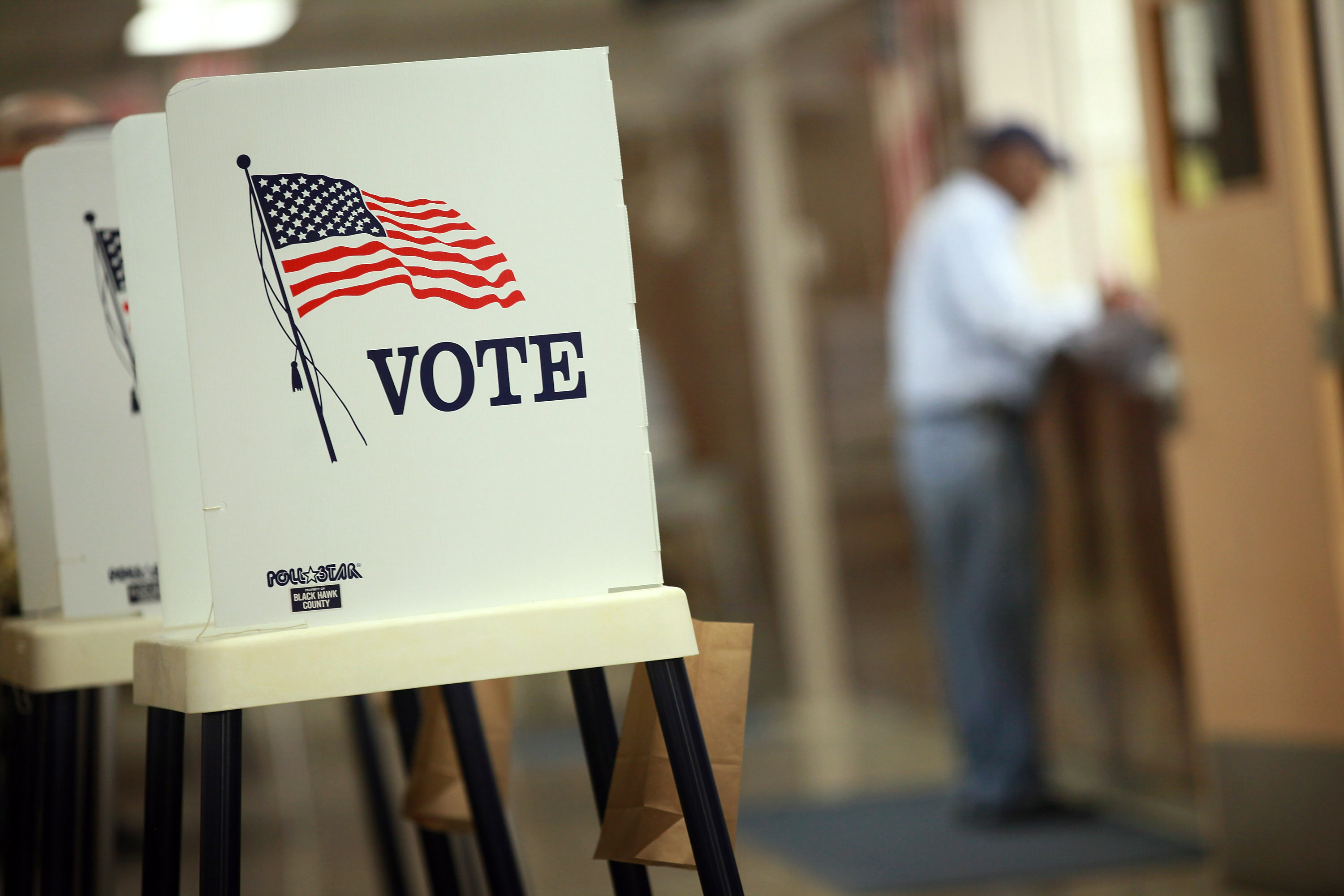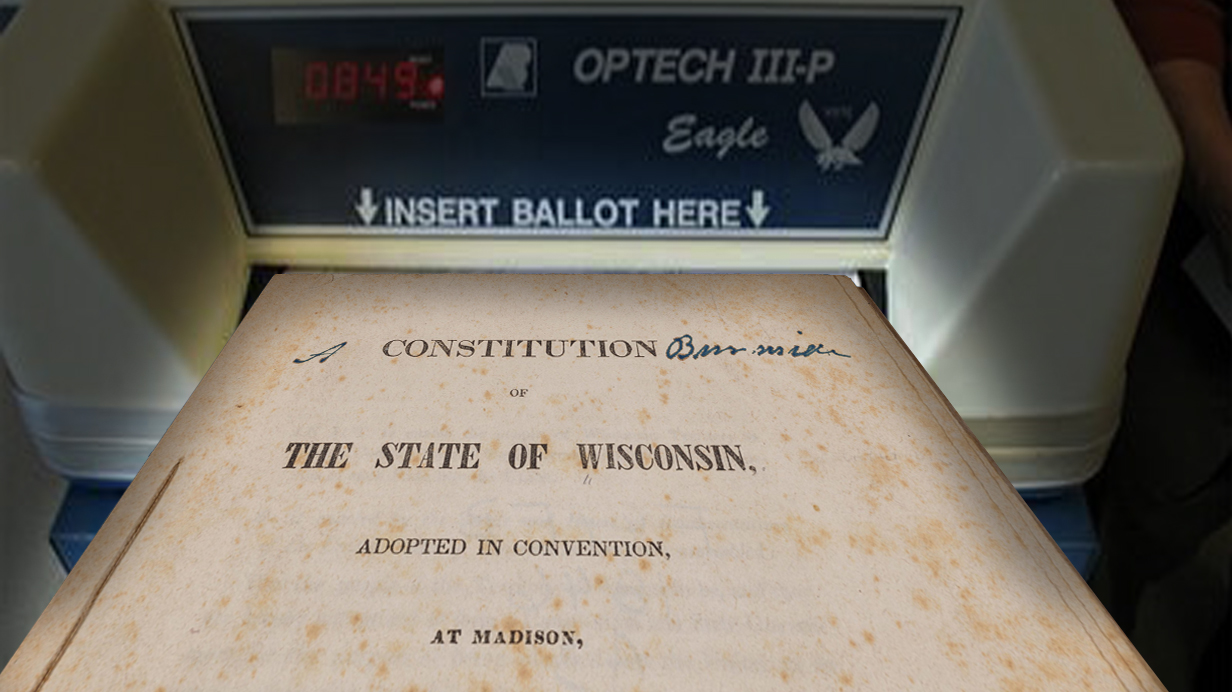
By MacIver Staff
We’ve been raising questions and highlighting concerns about the Milwaukee Bailout bill that is on track to pass this month. Some are now criticizing our work and claiming that we are trying to “kill” the bill.
We are not trying to kill the bill.
All we have been doing is asking simple, basic questions that should have been asked and answered before a deal was announced, before a bill was introduced and before taxpayers start to pay Milwaukee’s bill. Asking questions is only tantamount to “killing” legislation if the legislation cannot bear any scrutiny.
It may be hopelessly outdated, but we still think a public policy solution should actually solve the problem it purports to solve. This proposed solution will NOT solve Milwaukee pension problem.
When supporters have turned the debate to the definition of words like bailout and flip-flop, it speaks volumes. We are happy to explain why we’re raising questions and defend the words we’re using.
1. It is a bailout
An act of the Legislature is required to provide financial resources to rescue Milwaukee from potential insolvency is a bailout. (Bankruptcy also requires an act of the legislature in Wisconsin.) It’s a financial bailout by any definition.
Whether there is a vote of their governing bodies or a referendum vote (which we are waiting to see if the Assembly will be “forced” into removing) doesn’t change the definition of a bailout.
Regardless of who votes on it, it does not mean that the increased sales taxes will magically only be paid by Milwaukeeans. If the goal was to raise taxes only on Milwaukee and Milwaukee’s residents to solve Milwaukee’s pension problem, the bailout could take the form of legislation to allow a temporarily increase in property taxes.
That way only residents and businesses who have a physical presence in Milwaukee would underwrite and pay for the bailout. But Milwaukee politicians didn’t ask for that (and we’re not advocating it).
The sales tax bailout plan is mindfully designed to spread the bailout costs beyond Milwaukee. It’s clear in Milwaukee’s rhetoric about being victims who don’t get their fair share from the shared revenue formula that they think folks outside their borders need to chip in more because it’s owed to them.
Alderman Bob Bauman suggests moving parks funding to MMSD because MMSD isn’t subject to levy limits or property tax controls. If increasing property taxes is OK with Milwaukee politicians to fix one problem, why wouldn’t they want to go to the property tax for the pension mess they’ve created?
Because this is more about politics than actual policy solutions.
2. This “least worst” option is not good governance
It is hard to look at this bailout bill and the process used so far as good governance.
Good governance would be getting answers to basic questions before proposing, pushing and defending a solution that doesn’t solve the problem.
We have been asking questions that should be asked. Watch the video of the legislative hearings on this bill. Not one of these basic questions were asked or answered during the hearing. Not one. Think about that for a second. What does that say about the proposed “solution”?
If the sales tax is being touted as a pension fix, why build in a skim so Milwaukee doesn’t have to put every cent of the new funds raised into the pensions that are driving them to Detroit-style bankruptcy? Was it to please special interests, or does Milwaukee really need extra pocket money on top of their roughly $30 million increase in the new shared revenue proposal?
How much would the built-in skim divert from the pension every year? At reasonable long-term rates of return, how long will the skim delay the full funding of the pension funds? How many additional years will taxpayers pay the higher sales tax in Milwaukee just so Milwaukee politicians can have a new slush fund for spending?
If the bailout is truly about solving the pension problem as quickly as possible, will the City of Milwaukee and Milwaukee County commit to add in more funding so that this problem is fixed as quickly as possible? Why not require a dollar amount?
With decades of systemic poor governance in Milwaukee the cause of the crisis, what kinds of strings should be attached to the funds to make sure the tax dollars coming from families’ pockets will not be wasted, and that will force the obviously reluctant governing bodies to reform their practices?
Why should taxpayers across the state be on the hook to bail out Milwaukee from a problem created by leaders only Milwaukee voters elected?
Where is a study/research/analysis showing this particular tax hike over a 30 year time frame will permanently solve the Milwaukee pension problem?
If there’s nothing to back those numbers up, where did they come from? What are they based on?
Is there anything to provide any assurance that the current youngest Milwaukee employees will have their pensions secure if they live 30-40 years past when the 30-year sales tax bailout runs out?
What other options were considered for the bailout? Was consideration given to changing their revenue mix and why was that rejected for a tax increase?
Why was a sunset put in place when the bill builds in a skim to be spent on ongoing expenditures? Doesn’t this create a “fiscal cliff” that will require the tax to be permanent? Is the sunset just a talking point?
How much has the City of Milwaukee and Milwaukee County paid towards their pension plans for the last thirty years? Is this a case where the irresponsible local politicians, rather than fully paying for the pension they promised their government employees, just kicked the can down the road to create this bailout crisis?
How many members in each house support removing the referendum requirement, and will they go on record?
Is there any plan to provide Wisconsinites meaningful tax relief, or is the story of this session going to be higher taxes, a Milwaukee Bailout, bigger government and yet another sport stadium handout?
3. Detroit was both a bailout and a bankruptcy
Detroit is a good example of another mismanaged city that the pain of their bailout was borne by taxpayers who never lived there and never voted for the officials that caused their financial problems.
MacIver doesn’t prefer bankruptcy. We prefer honest policy debate, that puts taxpayers first.
We investigated a claim made at the public hearing that according to a neighbor of one of the supporters of the deal, “when Detroit went bankrupt, the pensioners got about 48 cents on the dollar.” Rather than just assume that this friend of a friend was a public policy expert and that this testimony was actually true, we did some checking to determine what happened to pensions in Detroit after the city declared bankruptcy.
According to news accounts and the Mackinac Center for Public Policy in Michigan, there was a 4.5% cut for general workers and no cut for fire and police, who had their cost of living adjustments cut 1%. Digging into the specifics of the bill and the claims being made in its support is basic diligence, not a policy position.
And on Detroit: Michigan gave them $350 million in bailout funds to help allow the city to avoid making pension contributions for 9 years. (Milwaukee has already done the ‘make zero contributions” thing.)
The sales taxes raised under this bill would be expected to hit the Michigan bailout amount of $350 million in under a year and a half. With zero growth in sales tax revenues over 30 years, Milwaukee would collect $8 billion in bailout taxes. And the built-in skim which could amount to $10s of millions a year – doesn’t even go to the pension problem which all of the $350 million Michigan bailout dollars did.
4. It is a flip-flop. Don’t take our word, look at what the politicians actually said just two years ago.
Maybe they think they have a good reason to flip-flop. But it’s still a flip-flop. Look at the exact quote from two years ago when the city was facing the same problems – cuts in services, insolvency, irresponsible decision-making, lack of courage…
“There is no chance this is going to happen. I think the problem we are looking at, especially in Milwaukee, is systematic problems where they have made bad decisions over decades they now do not have the courage to solve. Now they want to go to taxpayers for an easy, quick fix. That is just not going to happen.”
The bill Republicans drafted just two years later gives the city 4 TIMES the amount of sales tax as proposed by the governor last session – an easy fix for decades of bad decisions. Even if you think it’s the right thing to do, completely changing your position is still a flip-flop.
The governor and Democrats have also flip-flopped on their previous support of a referendum to raise the taxes they now oppose.
We completely agree that the Milwaukee pension mess is not the Republicans’ fault. Milwaukee leaders – and the people who continue to elect people who drive their community to the brink of fiscal disaster – bear the blame. Generationally irresponsible governance landed Milwaukee in front of majority Republicans looking for a bailout.
In ancient times a couple years ago, Republicans were worried about how excessive pandemic cash-dumps were driving inflation and growing government. Milwaukee is dumping “decades of bad decisions” on the state’s doorstep, and asking for “an easy, quick fix.”
Nobody is surprised Milwaukee didn’t have the courage to solve their own problems, but we should expect conservatives to have the courage to find real solutions, and not turn to a quick, easy tax increase to bail them out.
While the politicians and the supporters of the bailout would certainly prefer if MacIver stayed silent or tacitly endorse the deal, we just can’t. There are too many fundamental and basic questions that have not only gone unanswered but more concerning is the fact that these questions were never even asked or discussed during the legislative hearing. It stuck out like a sore thumb that the Legislators did not do their due diligence during the hearing or, you know, their actual job – to ask real questions.
These fundamental and basic questions need to be debated and scrutinized before one can even begin to analyze the merits or shortcomings of the legislation and the deal.
That is what we have been doing up to now and what we will continue to do until taxpayers, all Wisconsin taxpayers, have the information they need to decide for themselves if the Milwaukee bailout is a good deal.
